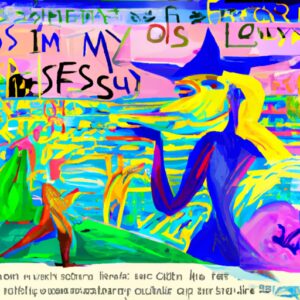Ciao! Are you looking to add some Italian flair to your compliment game? Look no further!
Learning how to compliment someone in Italian not only adds a touch of sophistication to your language skills but it can also make the recipient feel extra special.
Whether you are traveling to Italy, have Italian friends, or want to impress someone with your linguistic abilities, mastering these flattering phrases will come in handy.
From complimenting someone’s appearance to praising their personality, we’ve got you covered with a list of phrases that will make anyone’s day.
So, let’s dive in and learn how to sprinkle some Italian charm into your everyday conversations. Che bella idea! (What a beautiful idea!)
Why complimenting in Italian is important
Complimenting someone in their native language can make them feel appreciated, understood, and respected.
It’s an easy way to show that you value their culture and language and that you are making an effort to communicate with them on a deeper level.
In Italy, compliments are an integral part of daily life, and people often use them as a way to establish rapport and build relationships.
Whether you are complimenting a stranger, a friend, or a loved one, using the right words can make all the difference.
Basic Italian phrases for compliments
Before we dive into specific categories of compliments, let’s start with some basic Italian phrases that can be used in a variety of situations.
- “Complimenti!” – Congratulations!
- “Bravo/a!” – Well done!
- “Bellissimo/a!” – Very beautiful!
- “Eccezionale!” – Exceptional!
- “Fantastico/a!” – Fantastic!
- “Molto impressionante!” – Very impressive!
- “Stupendo/a!” – Wonderful!
- “Meraviglioso/a!” – Marvelous!
These phrases can be used for a range of compliments and can be modified for a variety of situations.
Complimenting someone’s physical appearance
Italians are known for their sense of style, and complimenting someone’s appearance is a great way to connect with them.
Here are some Italian phrases you can use to compliment someone’s physical appearance:
- “Sei molto carino/a” – You are very cute.
- “Hai un sorriso bellissimo” – You have a beautiful smile.
- “Che bella la tua camicia” – What a beautiful shirt you have.
- “I tuoi occhi sono molto belli” – Your eyes are very beautiful.
- “Hai un aspetto fantastico” – You look fantastic.
- “Sei molto elegante” – You are very elegant.
- “Il tuo abbigliamento è molto alla moda” – Your outfit is very fashionable.
It’s important to note that Italians can be very direct in their compliments, and it’s not uncommon to hear comments like “Che belle gambe!” (What beautiful legs!) or “Che bel sedere!” (What a beautiful butt!).
While these comments might seem forward to English speakers, they are often seen as harmless and even flattering in Italian culture.
Complimenting someone’s personality traits
In addition to physical appearance, Italians value personality traits such as kindness, intelligence, and humor.
Here are some Italian phrases you can use to compliment someone’s personality:
- “Sei così gentile” – You are so kind.
- “Hai un grande cuore” – You have a big heart.
- “Sei molto intelligente” – You are very intelligent.
- “Sei così divertente” – You are so funny.
- “Sei molto coraggioso/a” – You are very brave.
- “Hai un grande spirito” – You have a great spirit.
- “Sei molto generoso/a” – You are very generous.
Italians are also known for their passion and enthusiasm, and it’s common to hear compliments that express admiration for someone’s energy and spirit.
Complimenting someone’s skills and achievements
In Italy, success and achievement are highly valued, and it’s common to compliment someone on their skills or accomplishments.
Here are some Italian phrases you can use to complement someone’s skills and achievements:
- “Hai fatto un lavoro eccellente” – You did an excellent job.
- “Sei molto bravo/a nel tuo lavoro” – You are very good at your job.
- “Hai un grande talento” – You have a great talent.
- “Hai raggiunto un grande traguardo” – You have achieved a great milestone.
- “Sei stato/a molto coraggioso/a” – You have been very brave.
- “Sei una vera ispirazione” – You are a true inspiration.
- “Hai avuto un grande successo” – You have had a great success.
It’s important to note that while Italians value success and achievement, they also value humility and modesty.
When receiving a compliment, it’s common to downplay one’s accomplishments or deflect praise onto others.
Common mistakes to avoid when complimenting in Italian
While compliments are generally well-received in Italian culture, there are some common mistakes that English speakers should avoid.
Here are some things to keep in mind when complimenting in Italian:
- Use the formal “lei” form when complimenting someone you don’t know well or someone in a position of authority.
- Avoid using overly familiar language, especially with strangers or people you have just met.
- Be sincere in your compliments – insincere or exaggerated compliments can come across as insincere or even insulting.
- Avoid commenting on someone’s weight or physical appearance in a negative way.
- Avoid making comparisons between people, especially when it comes to physical appearance.
- Be aware of cultural differences – what might be seen as a compliment in one culture might be seen as inappropriate in another.
Using compliments in Italian culture
Compliments are an integral part of Italian culture, and they are used in a variety of social situations.
Here are some examples of when and how to use compliments in Italian culture:
- When meeting someone for the first time, it’s common to compliment their appearance or ask about their interests.
- When dining out, it’s common to compliment the food or the chef.
- When visiting someone’s home, it’s common to compliment the decor or the ambiance.
- When attending a social event, it’s common to compliment the host or the other guests.
- When conducting business, it’s common to compliment someone’s skills or accomplishments.
In general, Italians value social connection and building relationships, and compliments are seen as a way to establish rapport and show respect.
How to respond to compliments in Italian
When receiving a compliment in Italian, it’s important to respond graciously and with humility.
Here are some Italian phrases you can use to respond to compliments:
- “Grazie mille!” – Thank you so much!
- “Che gentile da parte tua!” – How kind of you!
- “Mi hai fatto felice” – You have made me happy.
- “Non lo meritavo” – I didn’t deserve it.
- “Grazie per le belle parole” – Thank you for the kind words.
- “Sono molto commosso/a” – I am very touched.
- “Grazie per avermi fatto sentire così speciale” – Thank you for making me feel so special.
Remember, it’s important to be gracious and humble when receiving compliments and to avoid downplaying or denying one’s accomplishments.
Practice exercises for complimenting in Italian
Now that you have learned some basic Italian phrases for compliments, it’s time to practice!
Here are some exercises you can do to improve your Italian compliment game:
- Practice complimenting someone’s appearance using different phrases and adjectives.
- Practice complimenting someone’s personality traits using different phrases and adjectives.
- Practice complimenting someone on their skills or accomplishments using different phrases and adjectives.
- Practice responding to compliments graciously and with humility.
Bottom line
Learning how to compliment someone in Italian is not only a valuable language skill, but it can also help you connect with Italian culture and build relationships with Italian speakers.
Whether you are complimenting someone’s appearance, personality, or accomplishments, using the right words can make all the difference.
So, practice your Italian compliments, and remember to be gracious, sincere, and humble when giving and receiving compliments. Buona fortuna! (Good luck!)
How to Improve Your Speaking if You Don’t Have a Speaking Partner?
Are you struggling to improve Italian-speaking skills, because you don’t have a conversation partner?
Or, your Italian friends are fantastic to hang out, but they don’t correct you as often as you’d like. If that’s the case, you can get an AI conversation partner, powered by GPT technology, and engage in unlimited, beginner, intermediate or advanced conversations, based on your level, through both text or speech.
While you chat, you get instant feedback on your errors. Plus, you can switch between Italian and English at any time. Not only you’ll be improving your written skills, grammar and vocabulary, but spoken skills and pronunciation as well.










One Response
Grazie mille per queste utili frasi! Mi saranno molto utili quando voglio fare un complimento a qualcuno in italiano.